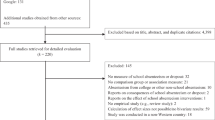Abstract
The research investigated reasons for leaving study amongst a sample of 118 mature age female students with children who had been enrolled at one of three eastern Australian universities. Analysis of questionnaire data revealed three major types of motive for attrition. Firstly, a strong socio-economic class influence was found. Women whose own and/or whose husbands' social class indicators were low tended to leave study because of a combination of lack of support from family for the mother's study, lack of money, weight of domestic responsibility and lack of knowledge or skills expected at university. Secondly, women who had been enrolled in non-traditional subjects (economics/business/law) were relatively over-represented amongst the discontinuing students and were particularly likely to cite lack of academic support or staff hostility as a reason for leaving. Thirdly, reasons for leaving study were found to be connected to student's age, suggesting a life style interpretation. Younger women with younger children were likely to leave because of family, financial or child care related reasons. Older women were more likely to leave because of practical difficulties or course dissatisfaction.
Similar content being viewed by others
References
Astin, H. (1976). ‘A profile of the women in continuing education’,in Astin, H. S. (ed)Some action of her own: The adult woman and higher education. Lexington, Mass: Lexington Books.
Boshier, R.W. (1971). ‘Motivational orientations of adult education participants: A factor analytic exploration of Houle's typology’,Adult Education 21, 3–26
Burns, A., Scott, C, Cooney, G. & Gleeson, G. (1988).Educating Mary: Married and single mothers returning to study. School of Behavioural Sciences, Macquarie University.
Burns, A. & Scott, C. (1993). ‘Career Trajectories of Single and Married Mothers who Complete Tertiary Study as Mature age Students’,Education and Society 11(1), 39–50.
Commonwealth Department of Employment, Education and Training. (1988).Higher education: A policy statement. Canberra: Australian Government Printing Service.
Currie, J. & Baldock, C. (1989). ‘Access to tertiary studies: The case of mature age students’,The Australian Universities Review (32)1, 5–13.
Everitt, B.S. & Dunn, G. (1983).Advanced methods of data exploration and modelling. London: Heinemann Educational Books.
Kelly, S. (1982). ‘Changing parent-child relationships: An outcome of mother returning to college’,Family Relations 31, 287–294.
Kelly, S. (1987).The prize and the price: The changing world of women who return to study. Sydney: Methuen Haynes
Lorr, M. (1983).Cluster analysis for social scientists: Techniques for analysing and simplifying complex blocks of data. San Francisco: Jossey-Bass Ltd.
Maslin, A. (1978).Older under-graduate women at an urban university: A typology of motives, ego development, sex typedness and attitudes towards women's role. Doctoral Dissertation: Temple University.
Metzner, B.S. & Bean, J.P. (1987). ‘The estimation of a conceptual model of non traditional undergraduate student attrition’,Research in Higher Education 27, 15–35.
Mishler, C. (1983). ‘Adults' perceptions of the benefits of a university degree’.Research in Higher Education 19, 213–230.
Pirnot, K. (1987). ‘Reentry women: A longitudinal study of persistence in non-traditional students’,Journal of NAWDAC 50, 20–26.
Richards, L. (1985).Having families: Marriage, parenthood and social pressure in Australia. Ringwood, Victoria: Penguin.
Scott, C., Burns, A. & Cooney, G. (1992). ‘Motives for return to study: Mature age women’,International Journal of Career Development 4(3), 32–39.
Speer, L. J. & Dorfman, L. T. (1986). ‘The outcomes of reentry education: Personal and professional development in middle-aged and older women graduates’,Educational Gerontology 28, 253–265.
West, L., Hore, T., Eaton, G. & Kermond, B. (1986a).The impact of higher education on mature age students. Commonwealth Tertiary Education Commission, Canberra.
West, L, Hore, T., Bennie, C., Browne, P. & Kermond, B. (1986b).Students withdrawing from full-time education. Higher Education Advisory and Research Unit, Monash University.
Author information
Authors and Affiliations
Rights and permissions
About this article
Cite this article
Scott, C., Burns, A. & Cooney, G. Reasons for discontinuing study: The case of mature age female students with children. High Educ 31, 233–253 (1996). https://doi.org/10.1007/BF02390446
Issue Date:
DOI: https://doi.org/10.1007/BF02390446




